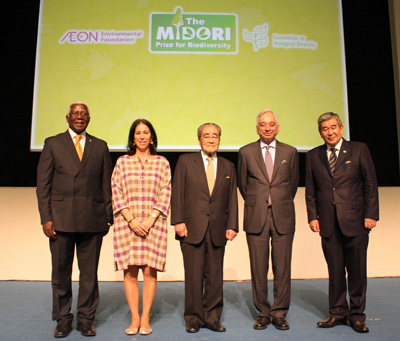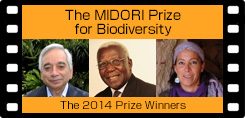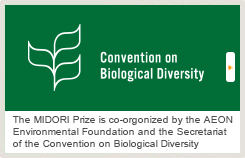21/10/2014
The MIDORI Prize for Biodiversity 2014 Winners' Forum Held
The MIDORI Prize for Biodiversity 2014 Winners' Forum was held on 21 October 2014 at the U Thant Hall of the United Nations University, Tokyo, Japan, under the joint auspices of the AEON Environmental Foundation and the Secretariat of the Convention on Biological Diversity.
Lectures were given by the three Prize Winners and a panel discussion inviting Prof. Shiro Wakui as moderator was held at the Forum.
Outline of the Lectures
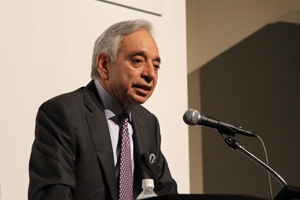
Dr. Kamal Bawa (14:10-14:40)
President, Ashoka Trust for Research in Ecology and the Environment (ATREE), India
Distinguished Professor, University of Massachusetts, Boston
“Global Change, Biodiversity, and Human Well-being: Perspectives from the Himalaya”
50 years ago, I visited the valley of Darjeeling for the first time. Since then, I have been fascinated by the diverse lives in the Himalaya. We can find hundreds of unnamed species in Himalayan biodiversity hotspots. Biodiversity protects lives of a lot of people, but the situation has changed due to serious environmental factors including climate change. The lives of Himalayan people have been greatly affected by the increase in temperature of 1.5C and rainfall pattern change. Today, scientists and policy makers are desperately required to take actions for protect the livelihood of the regional people using various data.
At the ATREE, the think-tank which I established in Bangalore, India in 1996, inter-exchange and integration of multi-disciplinary knowledge have been conducted through the collaboration of researchers, policy makers, practitioners and citizens. ATREE also has made efforts in order to increase economic, social and ecological benefits of the people in the region through environmental education and the improvement of their livelihood. Sustainable landscapes and the integration of approaches and formulation of institutions and policies will be required more in the future.
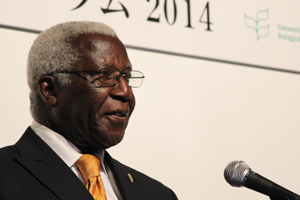
Dr. Alfred Oteng-Yeboah (14:40-15:10)
Chair, Ghana National Biodiversity Committee
“Understanding, Using and Caring for Nature to Benefit Humanity and the Living World”
Do we really care for nature? What is nature? What is biodiversity? The answers are not simple. Now, the use of ecological service corresponding to life supporting system is becoming difficult due to the unsustainable use of biodiversity. Is there a way out of the environmental mess? Some hints can be found in current global efforts. The United Nations General Assembly resolution 65/161 which declared 2011-2020 as the UN Decade on Biodiversity suggests us the way to sustainably use and conserve biodiversity toward the future.
Also, Intergovernmental Platform on Biodiversity & Ecosystem Services (IPBES), a framework serving as an interface between science and policies, is very effective in consensus-building related to biodiversity. To develop a set of Sustainable Development Goals (SDGs), which will build upon the Millennium Development Goals (MDGs), more collaboration among governments, the private sector, individuals and communities will be increasingly necessary. At CBD COP 11 in India, a wonderful slogan, "Nature Protects If She is Protected" was employed. It will be possible to achieve SDGs by 2030 if we can truly understand, use and care for nature through various activities.
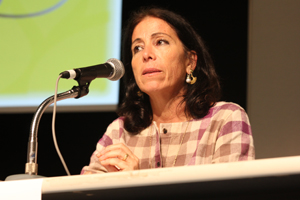
Dr. Bibiana Vilá (15:10-15:40)
Director, Vicuñas, Camelids and Environment (VICAM)
Principal Researcher, National Research Council (CONICET) Argentina
“Wild Vicuñas in Jujuy, Science for Conservation: Researchers and Local Communities, Working Together Towards Sustainability”
For the people living in the Andean altiplano, vicuñas are a wild species of economic and socio-cultural importance. Their ecological importance is also enormous. Vicuñas are a keystone species which has potentially great influences on the regional ecosystem and also an umbrella species indirectly protecting the many other species that make up the ecological community of the habitat. However, from the period of Spanish conquest, hundreds of thousands of vicuñas were heavily hunted for export to Europe, and their population massively decreased.
In order to recover the population of vicuñas, VICAM, a research group, revived an ancient pre-hispanic wildlife capture technique, the "chaku," that enables shearing fiber from live vicuñas by surrounding them. Researchers and local Andean communities have worked together, and the researchers have compiled the scientific data obtained from the chaku into books and papers. Today, the vicuña population has recovered due to their quiet dedication.
Also, environmental education for students and teachers is a key issue in promoting the conservation and sustainable use of vicuñas. VICAM has produced educational materials, books and kids' programs in order to make a much wider range of people aware of their immediate natural environment, the Andean altiplano.
Panel Discussion
Theme: "Biodiversity and Regions from the Perspective of Natural Capital"
Moderator: Prof. Shiro Wakui
(Professor, Department of Environmental and Information Studies, Tokyo City University; Vice Chairman, Japan Committee of the United Nations Decade on Biodiversity)
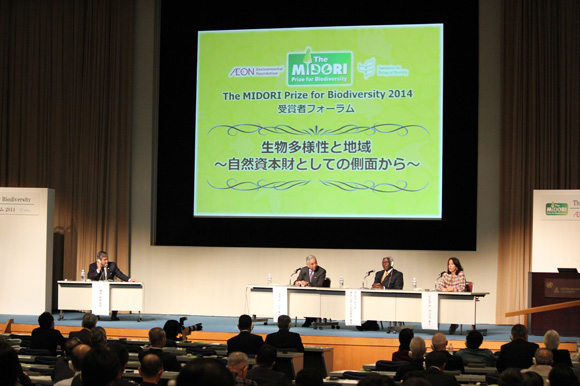
Environmental Consideration for Vulnerable People is a Key to Form a Sustainable Society
Vulnerable people who have to live from the natural environment are greatly damaged by the serious environmental pollution. It is essential to care for such poor people in order to form a society that sustainably uses natural capital as well as lives in harmony with nature.
Green Growth, Satoyama, Satoumi
In order to use and conserve biodiversity as natural capital, the concepts of "Green Growth" which enables both environmental conservation and economic growth and "Satoyama, Satoumi" which have nurtured and maintained rich nature through appropriate use by humans will be increasingly important toward the future.
Mother Nature is a Global Common Concept
Concepts of Mother Nature such as "Pachamama" in Argentina, "Asase Yaa" among the Akan speaking people in Ghana and gods in India are universal. When we use biodiversity as natural capital, it is indispensable for us to freshly evoke a sense of awe towards Mother Nature, and cherish her blessings.
